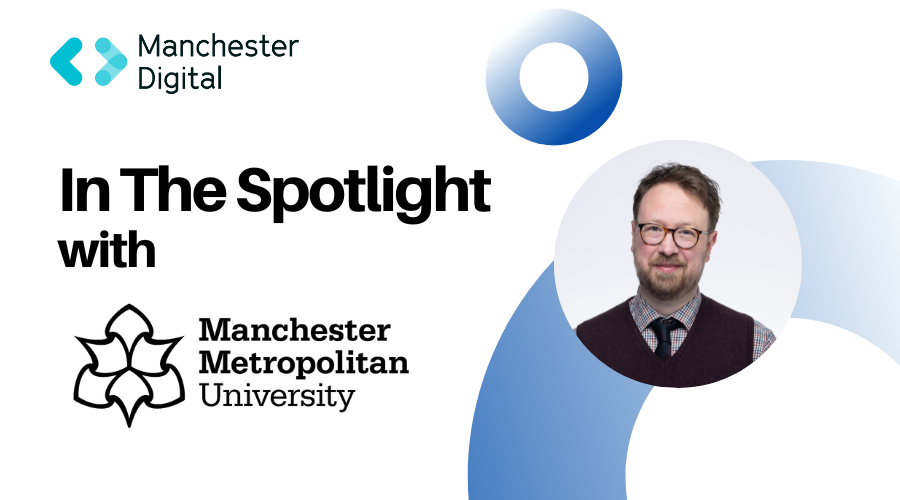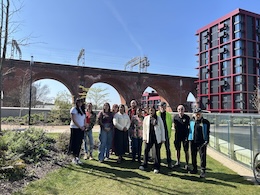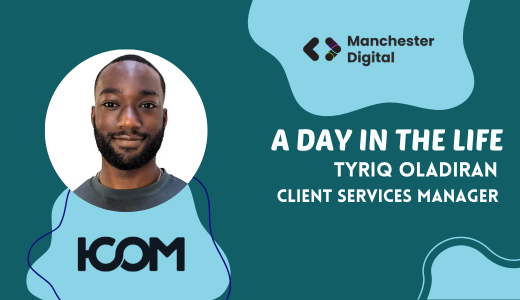
At Manchester Digital, we like to interview our members to find out a bit more about what they do and their work in the Greater Manchester digital and technology sphere. This week we're speaking with Rich, a Senior Lecturer in Business Information Systems at Manchester Metropolitan University.
Please introduce yourself…
I’m Rich, a Senior Lecturer in Business Information Systems at Manchester Metropolitan University, and the Programme Leader for the amazing BSc Business Technology degree programme, I’m a ‘pracademic’, with years of experience in technology project management, and I think I have a balanced perspective on bridging the gap between higher education and the needs of the digital sector. I specialise in knowledge transfer that supports innovation within digital businesses, so I really am pleased that we have partnered with Manchester Digital.
What specific technical skills do you believe are most valuable for graduates entering the digital and tech industry in Manchester?
Some of the most valuable technical skills for graduates entering the scene include data analytics, understanding cloud computing, AI/machine learning concepts, development skills, UX design, project management, and skills related to emerging technologies like IoT, blockchain, and XR. Pairing these with business, creativity, agility, and strong communication abilities is key and that seems to me to be the challenge. I also think that there is a clear and growing importance in relation to cybersecurity skills. With more and more business being conducted digitally, and with the cost and frequency of data breaches, everyone seems to be looking for graduates who understand security principles and can help protect ttheir digital assets.
Another skill area I see as increasingly valuable is what I’m calling "digital ethics" - the ability to navigate complex moral and societal implications of emerging technologies. We have issues like data privacy, algorithmic bias, and impact of automation on jobs, so businesses really need graduates who can think critically about these challenges and help develop ethical technological practices as they emerge.
How do you see the role of diversity and inclusion impacting the success of digital businesses in Manchester?
I think diversity and inclusion are critical for the success of Manchester's digital businesses because it enables a wider range of perspectives, leading to more innovation and better problem-solving. And at the same time there are lots of opportunities in Manchester for the right people, so attracting talent from all backgrounds creates a significantly larger talent pool. The challenges facing digital businesses are complex now as they are often new, so successfully tackling them requires teams that can draw upon a wide range of experiences, perspectives, and ways of thinking, and these teams are also much better at anticipating and meeting the needs of diverse customer bases. As the areas’ population continues to grow and change, reflecting that diversity within our businesses will be a key competitive advantage, as well as I think consumers of digital products and services increasingly expect and reward firms demonstrating inclusive values.
Of course, building truly diverse and inclusive organisations requires more than just hiring diverse talent. It means that graduate pipelines need to be equal – so in my programme we really benefit from being very diverse, and that means that we benefit from a truly multi-cultural experience. That said, sometimes in the Degree Apprenticeship pathways it is less diverse, and this is driven by employers and who they offer degree apprenticeships to, so with the increase in vocational qualifications and their popularity we need to also encourage employers to look at their recruitment methods. This means cultivating a culture where everyone feels valued, supported, and empowered to contribute their best work from pre-recruitment, and commitment from leadership, ongoing training and education that should be of clear alignment in these vocational programmes. Organisations themselves will also need a willingness to challenge their status quos to get this right.
What strategies or initiatives can employers implement to attract and retain top talent in the digital sector?
I think to attract the best digital talent, employers should focus on building progressive, purpose-driven cultures that people can conceptualise from outside of them being in that context. I think there is a clear value in people understanding the scope of the exciting projects within the business at a recruitment stage, as people want to work for organisations with a fulfilling brief. Knowing about the technologies you’ll work with helps too. If you have this clearer vision in mind of what it will be like, retention will come down to minimising differences in expectations, delivering on promises and making sure employees feel challenged, supported, and valued.
What I find interesting is that demand for digital skills is at an all-time high, and businesses need to be prepared to pay for top talent. So they also be realistic about what it will cost a graduate with talent to join and stay, and know that compensation for some of our university leavers, starting careers in the Tech sector, I think money is only part of the equation, and they will want to see opportunities for continuous learning and development within their packages – I think there is a really good argument in fact for more post graduate apprenticeships being strategically offered to support this, as we rarely see traditional route degrees to apprenticeship conversion, although this is a clear way to retain staff as they are within work and an education scheme leading to an MSc as part of the process. This is so important the tech sector, where the pace of change is so rapid, and employees want to know that they'll have the chance to keep their skills fresh and advance their careers, and such opportunities show real commitment to retention, and potentially a route to diversifying post-Grad apprenticeship cohorts further. Finally, something I have found through supporting graduate into roles in recent years is that they want to see a compelling mission and vision – they really want to work for organisations that are making a positive impact in the world, that can articulate a clear purpose and demonstrate a commitment to social responsibility.
In your opinion, what emerging technologies or trends should Manchester-based employers keep an eye on?
This is a hard question as things are constantly shifting. I think obviously AI is becoming more ubiquitous, we have edge computing, IoT is massively expanding and there are lots of low-cost ways to develop products and services in this space, XR is going mainstream, and I think smaller businesses can start to harness immersion. At the same time because these technologies are emerging and growing in use, there really has to be a bigger focus on cybersecurity as more business is done digitally. This is where I think we’ll see blockchain finding a lot more practical business application. There’s also a push in policy and support for cleaner tech and green tech solutions. At the same time are we teaching the right skills? I think we’re sometimes teaching people technical languages, but we also need to start upskilling people in all the low-code and no-code platforms that are emerging as business can do so much more now without the need for a developer, so at an early stage you can have access to technologies to help your business scale.
I’ll just add a few more technologies to my watch list:
• Quantum computing is about to happen, and I think we will soon be solving problems that were beyond classical computers, and I believe this will revolutionise fields that lots of businesses in our region have interest in – I would be watching sectors that require financial and predictive modelling, or even things like logistics optimisation, and already in the University we are working on a couple of projects with businesses now that I think when the technology is fully realised will be able to really disrupt the market.
• The decentralised web being built on blockchain technologies could transform how we interact online and give users greater control over their data – that will significantly disrupt trust and ethics and consumer expectations of digital products and services.
I think there will be lots of challenges to navigate, but businesses are going to need to be increasingly proactive in understanding these technologies and their implications, including through onboarding graduates. At the same time there is a clear convergence now of technologies occurring, so AI combined with IoT, blockchain with bioinformatics, XR with neurotechnology, and so on. I think business need to be aware that the most transformative innovations will likely emerge at the intersections of these technologies, so they will need to work across disciplinary boundaries and combine technologies in creative ways to disrupt new markets.
How can employers collaborate with educational institutions like Manchester Metropolitan University to bridge the gap between academia and industry needs?
Educational partnerships are so important and in my programme myself and the team are really focussed on making these happen, working together to inform curriculum and program development based on real-world industry needs. Joint research projects, but more than that we can often use a client problem and our amazing student contextualise theory and provide answers to a real-world problem. We have guest lectures from industry, and we’d love more Manchester Digital businesses to get involved. Another way is for businesses to provide projects or support innovation competitions for students – could a Manchester Digital business give our students hands-on experience solving real business challenges, gain some contacts, recommendations of LinkedIn, but at the same time be enabled to identify talent early? Get in touch with me to discuss because these are things we can do! We have brilliant student internships and consulting projects - so you could embed a student in your organisations for a short-time, or even a gap year and it’s a great way to onboard and retain graduates when they finish their degrees, as many will work part-time for their hosts in the third year and join full-time after graduation.
Another area I think that is hard to get right is professional development for faculty, where I believe we have future opportunities to develop industry sabbaticals with clear research outputs and the ability to tell the story of organisations as research partners. Ultimately, I think the goal should be to create a cycle where industry informs academia, academia trains industry-ready talent, and that talent drives innovation and growth in industry, which then feeds back into academic research. Of course, none of this ever happen automatically. It will require relationships and a willingness to experiment and adapt, and this is why the partnership with yourselves, and your members can make a real difference, enabling synergies and driving collaborations.
Thank you Rich!
Learn more about Manchester Metropolitan University here.










